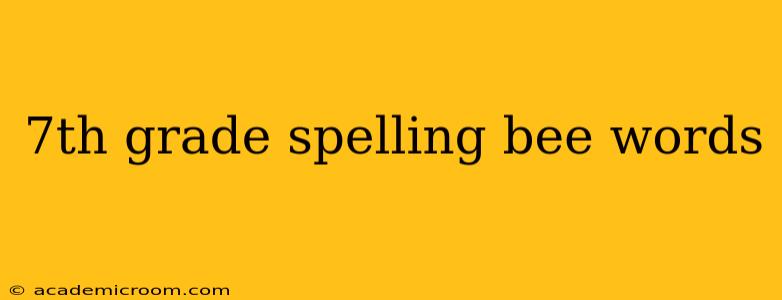7th Grade Spelling Bee Words: A Comprehensive Guide for Success
Preparing for a 7th-grade spelling bee requires dedication and a strategic approach. This guide delves into the types of words typically encountered, offers effective study techniques, and addresses common concerns. We'll explore word origins, common spelling pitfalls, and resources to help you conquer the competition.
What Kinds of Words Appear in 7th Grade Spelling Bees?
7th-grade spelling bee words often build upon vocabulary learned in earlier grades, introducing more complex prefixes, suffixes, and roots. Expect to encounter words from various origins and subject areas, including:
-
Greek and Latin Roots: Many English words derive from Greek and Latin. Understanding these roots significantly improves spelling accuracy and vocabulary comprehension. For example, knowing the root "photo" (light) helps with words like "photograph," "photosynthesis," and "photogenic."
-
Medical Terminology: Expect words related to the human body and medical procedures, such as "appendicitis," "cardiovascular," or "ophthalmologist."
-
Scientific Terms: Science-related words often involve complex spellings and multiple syllables, for instance, "equilibrium," "chromosome," or "biodegradable."
-
Literary Words: Words frequently used in literature, with often unusual spellings, will be part of the mix. Examples include "ubiquitous," "incessant," or "ephemeral."
-
Words with Difficult Spellings: Many words in 7th-grade spelling bees feature silent letters, tricky vowel combinations, or easily confused letter pairs (e.g., "i" before "e" except after "c").
H2: What are some common spelling mistakes in 7th grade?
Common spelling mistakes at this level often stem from confusion with similar-sounding words (homophones), inconsistent vowel sounds, and the incorrect application of spelling rules. For instance, many students confuse "there," "their," and "they're," or struggle with words containing "ie" versus "ei" combinations. Understanding the rules governing these scenarios is crucial.
H2: What are some good resources for studying 7th grade spelling words?
Several resources can aid your preparation:
-
Spelling Bee Word Lists: Numerous websites and books offer comprehensive lists of spelling bee words categorized by grade level. These lists often include definitions and example sentences.
-
Flashcards: Creating flashcards for challenging words helps with memorization through repetition and visual association.
-
Online Spelling Games: Interactive spelling games make learning fun and engaging, improving retention through active participation.
-
Dictionaries and Thesauruses: These tools provide accurate spellings, definitions, and word origins. Consulting these resources helps build a broader understanding of vocabulary.
-
Practice Tests: Taking practice tests simulates the actual spelling bee environment, reducing anxiety and identifying areas for improvement.
H2: What strategies can I use to learn 7th grade spelling words effectively?
Effective study strategies are essential for success:
-
Break Down Words: Divide complex words into smaller parts (prefixes, suffixes, roots) to understand their meaning and structure.
-
Say It Out Loud: Pronouncing words correctly helps identify tricky sounds and spellings.
-
Visualize: Imagine the word's spelling while writing or saying it.
-
Use Mnemonics: Create memory aids (mnemonics) to remember difficult spellings; for example, creating a silly sentence incorporating the word's letters.
-
Practice Regularly: Consistent practice, even in short bursts, is more effective than cramming.
H2: Are there any sample 7th-grade spelling bee words I can study?
While providing an exhaustive list here is impractical, consider words like:
- accommodate
- acquaintance
- belligerent
- camouflage
- conscientious
- entrepreneur
- fuchsia
- guarantee
- hemorrhage
- idiosyncrasy
- irresistible
- jeopardy
- maneuver
- mischievous
- nuisance
- opportunity
- parallel
- perseverance
- questionnaire
- rhythm
- supersede
- treacherous
- unanimous
- vengeance
- whimsical
Remember this is not an exhaustive list, and the specific words encountered will vary. The key is consistent preparation, using diverse learning techniques, and developing a strong understanding of word structure and origins. Good luck!
